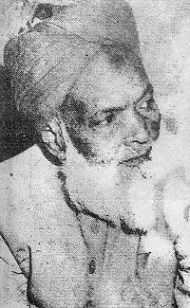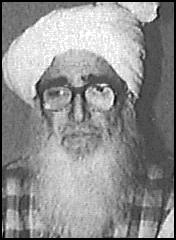
The Deobandi movement or Deobandism is a revivalist movement within Sunni Islam that adheres to the Hanafi school of law. It was formed in the late 19th century around the Darul Uloom Madrassa in Deoband, India, from which the name derives, by Muhammad Qasim Nanautavi, Rashid Ahmad Gangohi, Ashraf Ali Thanwi and Khalil Ahmad Saharanpuri after the Indian Rebellion of 1857–58. They opposed the influence of non-Muslim cultures on the Muslims living in South Asia. The movement pioneered education in religious sciences through the Dars-i-Nizami associated with the Lucknow-based ulama of Firangi Mahal with the goal of preserving traditional Islamic teachings from the influx of modernist and secular ideas during British colonial rule. The Deobandi movement's Indian clerical wing, Jamiat Ulema-e-Hind, was founded in 1919 and played a major role in the Indian independence movement through its participation in the Pan-Islamist Khilafat movement and propagation of the doctrine of composite nationalism.

Darul Uloom Deoband is an Islamic seminary in Deoband, Uttar Pradesh, India, at which the Sunni Deobandi Islamic movement began. Established in 1866 by Muhammad Qasim Nanautavi, Fazlur Rahman Usmani, Sayyid Muhammad Abid and others in 1866, it is one of the most important Islamic seminaries in India and the largest in the world. Mahmud Deobandi was the first teacher and Mahmud Hasan Deobandi was the first student.

Nek Muhammad Wazir was a prominent Pakistani mujahideen or jihadi leader. He was killed in a US drone strike in South Waziristan, FATA, Pakistan in 2004. This was the first CIA drone strike inside Pakistan.
ʻAbd al-Ḥaqq is an Arabic male given name, and in modern usage, surname. It is built from the Arabic words ʻabd and al-Ḥaqq, one of the names of God in the Qur'an, which give rise to the Muslim theophoric names. It means "servant of the Truth".
Maulvi Faqir Mohammed is an Islamist militant and, until March 2012, a deputy leader of the Pakistani Taliban umbrella group Tehrik-i-Taliban Pakistan. He was reported as killed on 5 March 2010 during a helicopter gunship attack on militants by the Pakistani military although he denied the reports as false. In July 2011, he resurfaced on the air broadcasting radio shows out of Afghanistan. He was captured in Afghanistan on 17 February 2013, and released by the Afghan Taliban in 2021.
Jamia Uloom-ul-Islamia is an Islamic University in Banoori Town, Karachi, Pakistan. The university continues the tradition of the Darul Uloom system initiated by Darul Uloom Deoband. As of 2007, there are about twelve thousand students in different departments of the Jamiah and its branches, including a number of foreign students from over sixty countries.

Darul Uloom Haqqania or Jamia Dar al-Ulum Haqqania is an Islamic Seminary in the town of Akora Khattak, Khyber Pakhtunkhwa province, northwestern Pakistan. The seminary propagates the Hanafi Deobandi school of Sunni Islam. It was founded by Maulana Abdul Haq along the lines of the Darul Uloom Deoband seminary in India, where he had taught. It has been dubbed the "University of Jihad" due to its methods and content of instruction, along with the future occupations of its alumni. A number of leading members of the Taliban, including past chief Akhtar Mansour, studied here.

Sami ul Haq was a Pakistani religious scholar and senator. He was known as the Father of Taliban for the role his seminary Darul Uloom Haqqania played in the graduation of most Taliban leaders and commanders, having close ties to Taliban leader Mullah Mohammed Omar.

Muḥammad Shafī‘ ibn Muḥammad Yāsīn ‘Us̱mānī Deobandī, often referred to as Mufti Muhammad Shafi, was a Pakistani Sunni Islamic scholar of the Deobandi school of Islamic thought.

Abdul Haq, also known as Abdul Haq Akorwi was a Pakistani Deobandi Islamic scholar and the founder, chancellor, and Shaykh al-Hadith of the Islamic seminary Darul Uloom Haqqania. He also served as vice-president of Wifaq ul Madaris Al-Arabia, Pakistan. He was involved in politics as a member of the political party Jamiat Ulema-e-Islam. He served three times in the National Assembly of Pakistan and was an active proponent of the Khatme Nabuwwat movement.
Sana-ul-Haq, better known as Asim Umar, was an Indian Jihadist militant leader of the al-Qaeda in the Indian Subcontinent. al-Qaeda leader Ayman al-Zawahiri announced the creation of AQIS and introduced Asim Umar as its leader in a video posted online in September 2014.
Saeed Ahmad Palanpuri, was an Indian Sunni Muslim scholar and author who served as Shaykh al-Hadith and Principal of Darul Uloom Deoband. A number of his books are required readings in Darul Uloom Deoband.

Rashid Ahmad Ludhianvi, was a Pakistani Islamic scholar and faqīh, who founded the Al Rashid Trust and the Jamia Tur Rasheed in Karachi. He served as the head of Darul Ifta Wal Irshad, a jurisprudential institute of the Darul Uloom Karachi and authored books such as Anwaar-ur-Rasheed, Jawahir-ur-Rasheed and Allah Ke Baghi Musalman. His religo-legal edicts were compiled and published as Ahsan ul-Fatawa in ten volumes.

Abdul Salam Hanafi is an Afghan Uzbek political and Deobandi-Islamic religious leader who is a senior leader of the Taliban, an acting second deputy prime minister, alongside Abdul Ghani Baradar and Abdul Kabir, of Afghanistan since 2021, and was a central member of the negotiation team in the Qatar office. He has also served as deputy minister of education in the Taliban government from 1996–2001. After the Taliban government collapse in 2001, following the United States invasion of Afghanistan, Hanafi was appointed by the Taliban leadership as a top general to oversee the Taliban’s military activities in Jowzjan Province, Northern Afghanistan from May 2007 until sometime in 2008.

Abdul Hakim Haqqani, also known as Abdul Hakim Ishaqzai, is an Afghan Islamic scholar and writer who has been the chief justice of Afghanistan since 2021 in the internationally unrecognized Taliban regime. He has also served as chief justice of the Supreme Court in the 1996–2001 Islamic Emirate of Afghanistan. He was the chairman of the Taliban negotiation team in the Qatar office. He is one of the founding members of the Taliban and was a close associate of the late leader Mullah Mohammed Omar.

This bibliography of Deobandi Movement is a selected list of generally available scholarly resources related to Deobandi Movement, a revivalist movement within Sunni Islam, adhering to the Hanafi school of law, formed in the late 19th century around the Darul Uloom Deoband in British India, from which the name derives, by Qasim Nanawtawi, Rashid Ahmad Gangohi and several others, after the Indian Rebellion of 1857–58. It is one of the most influential reform movements in modern Islam. Islamic Revival in British India by Barbara D. Metcalf was the first major monograph specifically devoted to the institutional and intellectual history of this movement. Muhammad Tayyib Qasmi wrote a book named The Tradition of the Scholars of Deoband: Maslak Ulama-i-Deoband, a primary source on the contours of Deobandi ideology. In this work, he tried to project Deoband as an ideology of moderation that is a composite of various knowledge traditions in Islam. This list will include Books and theses written on Deobandi Movement and articles published about this movement in various journals, newspapers, encyclopedias, seminars, websites etc. in APA style. Only bibliography related to Deobandi Movement will be included here, for Darul Uloom Deoband, see Bibliography of Darul Uloom Deoband.

This bibliography of Darul Uloom Deoband is a selected list of generally available scholarly resources related to Darul Uloom Deoband, a leading Islamic seminary and Muslim theological centre in India at which the Deobandi movement began, founded in 1866. It is one of the most influential reform movements in modern Islam. It created a largest network of satellite madrasas all over the world especially India, Bangladesh, Pakistan, Afghanistan neighboring countries in Asia and beyond, and as far afield as the Caribbean, South Africa, United Kingdom and the United States. Islamic Revival in British India by Barbara D. Metcalf was the first major monograph specifically devoted to the institutional and intellectual history of Deoband. Syed Mehboob Rizwi wrote History of Darul Uloom Deoband in 1977 in 2 volumes. This list will include Books and theses written on Darul Uloom Deoband and articles published about Deoband in various journals, newspapers, encyclopedias, seminars, websites etc. in APA style. Only bibliography related to Darul Uloom Deoband will be included here, for Deobandi movement, see Bibliography of Deobandi Movement.

Deobandi jihadism is a militant and political interpretation of Islam that draws upon the teachings of the Deobandi movement, which originated in the Indian subcontinent in the 19th century. The Deobandi movement underwent three waves of armed jihad. The first wave involved the establishment of an Islamic territory centered on Thana Bhawan by the movement's elders during the Indian Rebellion of 1857, before the founding of Darul Uloom Deoband. Imdadullah Muhajir Makki was the Amir al-Mu'minin of this Islamic territory; however, after the British defeated the Deobandi forces in the Battle of Shamli, the territory fell. Following the establishment of Darul Uloom Deoband, Mahmud Hasan Deobandi led the initiation of the second wave. He mobilized an armed resistance against the British through various initiatives, including the formation of the Samratut Tarbiat.

Deobandi fiqh is a school of Islamic jurisprudence that is based on the Hanafi school of Islamic law. It is associated with the Deobandi movement, which originated in India in the late 19th century and has since spread to other parts of the world, particularly in South Asia. Deobandi fiqh emphasizes a strict adherence to the Quran and the Sunnah, and seeks to ensure that all aspects of daily life are guided by Islamic law. It places a strong emphasis on the principles of fiqh, or Islamic jurisprudence, and is known for its strict interpretation of Islamic law. It also emphasizes the importance of Islamic ethics and morality, and emphasizes the need for Muslims to lead a pious and virtuous life. Deobandi fiqh has had a significant influence on Islamic education and scholarship, particularly in South Asia and among the global South Asian diaspora. It plays a foundational role in the judiciary of Afghanistan. It has also been associated with various Islamic political movements and has been a subject of controversy and debate within the Muslim community.
Mawlawi Abdul Ali Deobandi was a pro-Taliban Afghan cleric who served as Mullah Omar's advisor. He earned the title of Sheikh al-Hadith and Mufassir.












